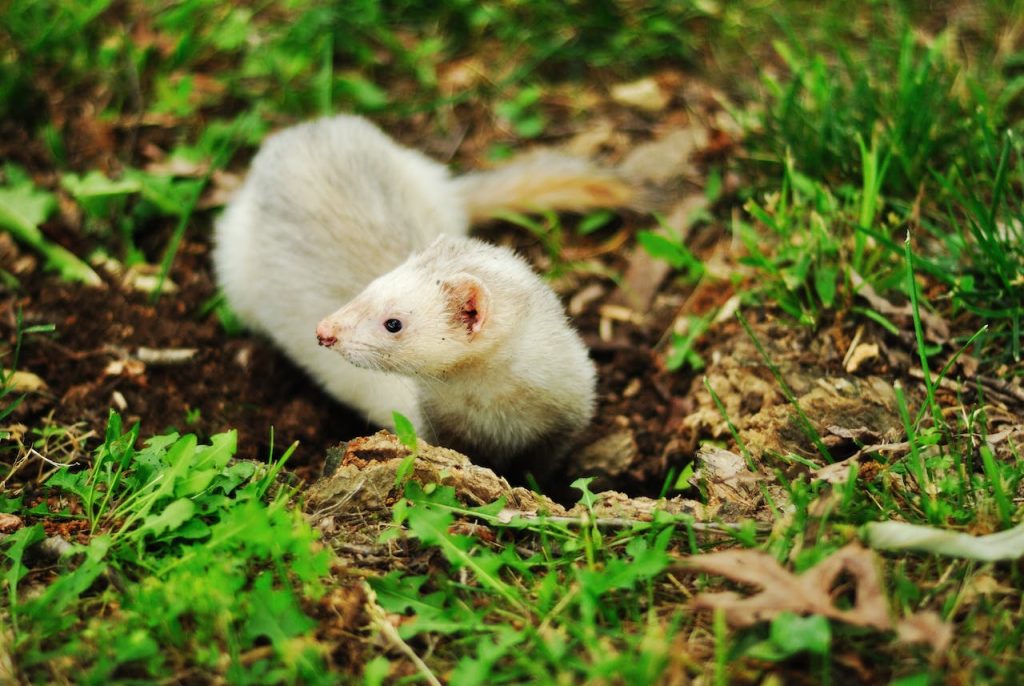In recent years, ferrets belonging to the weasel family have seen a surge in popularity as pets across the United States. Their playful, inquisitive nature and captivating charm have endeared them to many pet owners seeking a unique companion. They are known to form deep bonds with their caretakers, offering an enriching pet-keeping experience. Ferrets are captivating and energetic pets, with an estimated eight million kept in the United States. They are the third most popular pet choice, gaining popularity among pet owners.
Despite being predatory by nature, domesticated ferrets have adapted well to living in a home environment, making them an intriguing choice for those looking for a little out-of-the-ordinary pet. Ensuring their health and longevity involves understanding their specific needs and providing appropriate care, a commitment that more and more Americans are willing to undertake.
Understanding Ferret Lifespan
Understanding the lifespan of a ferret and the appropriate care tips are paramount for potential and current ferret owners. Like humans, ferrets have a predefined average lifespan, which can be influenced by various factors such as diet, environment, genetics, and healthcare access. This knowledge prepares owners mentally and financially for a long-term commitment, ensuring they can provide the necessary care throughout the pet’s life.
Additionally, understanding a ferret’s lifespan can help set realistic expectations concerning their health, activity levels, and potential age-related issues. A well-informed owner can better understand the progression of their pet’s life stages and, therefore, provide the most suitable care at each stage. Hence, knowledge about the ferret’s lifespan and the factors affecting it forms the foundation of responsible and ethical pet ownership.
Average Lifespan of Ferrets
On average, domestic ferrets live around eight years when kept in captivity. However, these figures can vary significantly depending on several influencing factors. Some well-cared-for ferrets have been known to reach 12, showcasing the potential for longevity when provided with optimal care and attention. Notwithstanding, it should be noted that, like any other pet, individual lifespans will differ. Hence, while these figures offer a ballpark estimate, they should not guarantee a ferret’s lifespan. Instead, owners should provide the best care to ensure their pet’s optimal health and well-being.
Factors Influencing a Ferret’s Lifespan
Genetics
Genetics plays a significant role in determining a ferret’s lifespan. Like in humans, a ferret’s genetic makeup can predispose it to specific health conditions that could impact its lifespan. A ferret from a lineage with a history of longevity and good health is more likely to live a longer life. Conversely, ferrets from lines with hereditary health issues may have a reduced lifespan.
Diet
A ferret’s diet is another crucial factor that can influence its lifespan. Being obligate carnivores, ferrets require a diet rich in high-quality animal proteins and fats for optimal health. A well-balanced diet low in fiber and carbohydrates can support a ferret’s health and extend its lifespan. Conversely, a poor diet can lead to obesity and related health issues, shortening a ferret’s life.
Healthcare
Access to regular and quality healthcare is vital in determining a ferret’s lifespan. Regular vet checks can help detect potential health issues early, increasing the chances of successful treatment and extending the ferret’s lifespan. Preventive healthcare, such as vaccinations and parasite control, is critical in maintaining a ferret’s health and longevity. Poor healthcare access or neglect can lead to untreated health issues, reducing a ferret’s lifespan.
While there is an average expectancy for a ferret’s lifespan, various factors can influence this. Responsible ferret ownership entails understanding these elements and providing appropriate care to optimize the pet’s lifespan.
Lifespan Expectancy Variations
Positive Influences on a Ferret’s Lifespan
Several factors can positively affect a ferret’s lifespan. A balanced, high-protein diet tailored to their nutritional needs can significantly enhance their overall health and longevity. Regular veterinary care, including preventive measures like annual check-ups, vaccinations, and parasite control, considerably increases their chances of longevity by proactively managing potential health issues. A safe, clean, and stimulating environment can also reduce stress and improve mental health, subsequently increasing their lifespan.
Negative Influences on a Ferret’s Lifespan
On the contrary, certain factors can negatively impact a ferret’s lifespan. A poor diet, high in carbohydrates and low in animal proteins, can lead to health complications such as obesity and insulinoma, reducing a ferret’s lifespan. Similarly, lack of regular veterinary care can result in unnoticed health issues that may become severe or even fatal if left untreated. Factors such as stress due to an unsuitable living environment, lack of exercise, and social interaction can decline a ferret’s mental and physical health, thus shortening their lifespan.
While genetics play a significant role in a ferret’s lifespan, other factors such as diet, healthcare, and environment can significantly influence it positively or negatively. Therefore, good genetics, a quality diet, regular healthcare, and a suitable living environment can enhance a ferret’s chances of a long, healthy life.
The Impact of Proper Care and Nutrition on a Ferret’s Longevity
Proper care and nutrition are integral to maximizing a ferret’s lifespan. An optimal diet and attentive care can significantly increase their quality of life and longevity.
Primarily, a balanced diet rich in high-quality animal proteins and fats is vital for ferrets, as they are obligate carnivores. Their dietary needs are unique, and a lack of appropriate nutrition can lead to health complications, including gastrointestinal issues and heart disease. Overfeeding or providing a carbohydrate diet can result in obesity, a common problem that can significantly shorten a ferret’s lifespan. Therefore, maintaining a balanced diet tailored to a ferret’s specific nutritional needs is paramount in ensuring optimal health and longevity.
In addition to nutrition, comprehensive care significantly affects a ferret’s lifespan. Regular vet check-ups allow for early detection of potential health issues, substantially increasing the chances for successful treatment and preventing severe or fatal outcomes. Preventive healthcare measures, such as vaccinations and parasite control, are equally necessary to maintain a ferret’s health and extend their lifespan.
Furthermore, the environment in which a ferret lives also affects its lifespan. Ferrets thrive in clean, safe, and stimulating environments. Providing them with an area to explore and play, along with regular interaction, not only enhances their physical health but also positively impacts their mental well-being, which is key to a long and healthy life.
Proper care and nutrition are not just factors but necessities in ensuring a ferret’s longevity. Through a balanced diet, regular healthcare, and a stimulating environment, ferret owners can significantly enhance the lifespan of their pets, ensuring they live a long, healthy, and fulfilling life.
Ferret Wellness and Longevity
Domesticated ferrets have an average lifespan of around eight years when kept in captivity. However, this figure is highly dependent on various factors such as genetics, diet, healthcare access, and environment. Ferret owners must understand these elements and provide appropriate care to maximize their pet’s health and longevity.
Optimal Nutrition for Ferrets
Ferrets are obligate carnivores, meaning their diet must primarily consist of meat. Their bodies are specifically designed to digest high amounts of animal protein and fat, with a low tolerance for fiber and carbohydrates. A balanced diet for a ferret should include a high proportion of animal-based proteins and fats, with a minimal amount of carbohydrates.
Premium ferret food available in the market usually meets their nutritional needs. This is typically made from chicken or lamb meal and is higher in protein (around 34-38%), higher in fat (around 20%), and lower in fiber (less than 3%).
Some ferret owners prefer to feed their pets a raw diet, including raw meats, organ meats, and occasional raw eggs. If choosing this route, it’s essential to ensure the diet is varied and balanced, as an all-meat diet could lack certain nutrients. It’s recommended to consult with a veterinarian or pet nutritionist to ensure all nutritional needs are being met.
Avoid feeding your ferret fruits, vegetables, dairy products, or dog food, as these can cause digestive issues and not provide the necessary nutrients. Treats should also be given sparingly, and be sure they are specifically designed for ferrets.
Hydration is also crucial for ferrets. Always ensure your pet has access to fresh, clean water.
Remember that each ferret is unique and may have specific dietary needs, particularly if they have a medical condition. Therefore, always consult a veterinarian when deciding about your ferret’s diet. A balanced, appropriate diet is critical in promoting a ferret’s longevity and overall health.
Exercise and Mental Stimulation
Physical activity and mental stimulation are crucial to a ferret’s wellness and longevity. Like most pets, ferrets need regular exercise to maintain a healthy weight and muscle tone. Without sufficient activity, they can become obese, which can lead to a host of health problems, including heart disease, diabetes, and arthritis. Engaging in play activities also helps ferrets hone their natural hunting and foraging skills, keeping them mentally sharp.
Ferrets are highly intelligent and curious creatures, requiring ample mental stimulation to prevent boredom and depression. Providing toys, puzzles, and opportunities for exploration can help satisfy their curiosity, stimulate their minds, and keep them emotionally healthy. Interactive play with their owners can also provide crucial social stimulation, strengthening the bond between pet and owner.
In essence, a balanced combination of physical activity and mental stimulation contributes to a ferret’s overall physical health and is also vital for their emotional well-being. Keeping your pet ferret active and mentally engaged can go a long way toward promoting their overall wellness and extending their lifespan.
Creating an Enriching Environment for Ferrets
Creating an enriching environment for ferrets involves curating a space that caters to their physical, mental, and social needs. Here are some tips to help achieve this:
- Safe Space: Ensure the ferret’s habitat is safe and secure. This includes choosing a spacious cage with secure latches and ensuring the surrounding area is free from potential hazards such as toxic plants, electrical wires, or small objects that could be choked on.
- Play Area: Ferrets are active and playful creatures. Designate a safe play area outside their cage where they can run, jump, and explore. This can be an enclosed room or a ferret-proofed part of your home.
- Toys: Provide a variety of toys to stimulate their minds and satisfy their natural curiosity. This can include tunnels, balls, and soft toys. Be sure to rotate the toys regularly to maintain their interest.
- Hideaways: Ferrets enjoy having cozy hideaways for rest and privacy. Providing hammocks, tunnels, or small boxes with blankets can create the perfect snuggle spot.
- Social Interaction: Ferrets are social animals and thrive on interaction. Spend quality time playing with your ferret every day. If possible, consider having more than one ferret for companionship.
- Cleanliness: Regularly clean the ferret’s habitat and litter box to maintain a healthy environment.
- Environmental Enrichment: Consider using food puzzles or scattering treats around their play area to encourage foraging behaviors, providing mental stimulation.
- Routine: Ferrets are creatures of habit. Establishing a routine for feeding, playtime, and rest can help them feel secure and comfortable.
Remember, creating an enriching environment for your ferret involves catering to their unique needs and behaviors. A well-curated environment can significantly enhance your ferret’s overall quality of life, contributing to their health and longevity.
Health Care and Regular Check-ups
Regular health checks are essential for a ferret’s overall wellness and longevity. Ferrets should have an annual check-up with a veterinarian, ideally one familiar with exotic pets like ferrets.
Ferret Health Monitoring
Regular health check-ups play a crucial role in maintaining a ferret’s well-being, helping detect potential health issues early. These appointments typically involve a general physical examination, dental check, weight monitoring, and necessary vaccinations. Furthermore, they allow you to discuss any concerns with your vet, such as changes in behavior, diet, or toilet habits.
Observing your ferret’s daily behavior can also help identify signs of potential health issues. Look out for symptoms such as lethargy, loss of appetite, difficulty breathing, changes in fecal matter, frequent scratching, or sudden weight changes. Particularly, ferrets are susceptible to diseases like adrenal disease, insulinoma, and lymphoma. Hence, it is crucial to seek veterinary advice if you notice any unusual behavior or physical changes in your ferret. Regular health monitoring and prompt action are vital aspects of responsible pet ownership, contributing significantly to a ferret’s overall health and longevity.
Veterinary Care and Vaccinations
Finding a veterinarian experienced with ferrets is crucial, as they require specialized care. Start by asking for recommendations from other ferret owners or breeders in your area, or search online for vet clinics that list ferrets as a species they treat. When you find potential candidates, don’t hesitate to ask about their experience with ferrets during your first visit. You need a vet who understands your pet’s unique needs and can provide appropriate treatments.
Vaccinations play a vital role in protecting your ferret from debilitating diseases. Ferrets typically need two primary vaccinations: one for canine distemper, a fatal and highly contagious disease, and another for rabies, a deadly virus that can be transmitted to humans. Your vet will guide you through the vaccination schedule, but the initial shots are typically given when the ferret is still a kit, followed by annual booster shots. It’s essential to keep these vaccinations up-to-date, as they significantly contribute to your ferret’s overall health and longevity. Always consult with your vet if you have questions or concerns about vaccinations.
Importance of Regular Vet Visits
Regular vet visits are critical to maintaining a ferret’s health and prolonging their lifespan. These visits enable early detection of potential health issues, which can be pivotal in ensuring successful treatment. Routine examinations can identify subtle changes in a ferret’s health status over time and enable preventive measures to be implemented before minor health issues escalate into severe diseases.
Veterinarians provide essential vaccinations, dental care, and parasite treatments, safeguarding your ferret’s health. Moreover, these visits offer an opportunity to discuss any concerns or observations about your ferret’s behavior, diet, or overall well-being, ensuring they maintain an optimal quality of life. Therefore, regular vet visits are not merely recommended; they are essential in securing your ferret’s long-term health and happiness.
Conclusion
Domesticated ferrets typically have an average lifespan of around eight years in the United States when kept in proper conditions. Their longevity is heavily influenced by several factors, including genetics, diet, access to healthcare, and the environment provided by their owners. A balanced diet rich in animal proteins and fats, regular exercise, mental stimulation, a safe and enriching living environment, and attentive health care, including regular vet check-ups and vaccinations, maximize a ferret’s lifespan. With the proper care and attention, ferrets can live long, healthy, and fulfilling lives.





